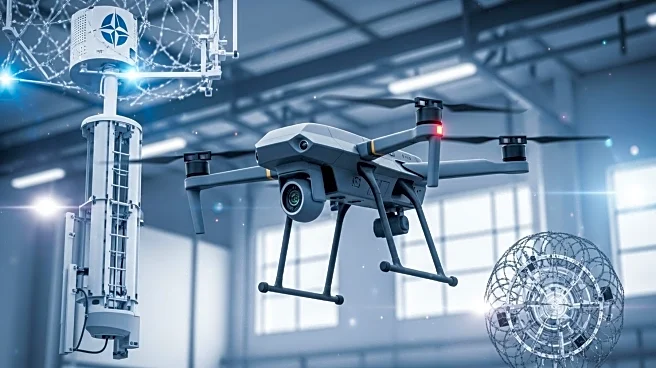What is the story about?
What's Happening?
An unidentified drone was detected flying over the Geilenkirchen airbase in Germany, a key NATO facility hosting AWACS reconnaissance aircraft. The drone entered a no-fly zone on Wednesday evening, briefly flying over the runway before disappearing. This incident is part of a series of similar occurrences across NATO countries, raising concerns about potential espionage and security vulnerabilities. German magazine Der Spiegel reported that security measures have been tightened, but the drone's origin and operator remain unknown. The incident follows a pattern of unidentified drones being spotted in Germany and other NATO countries, prompting urgent reviews of drone security protocols.
Why It's Important?
The Geilenkirchen airbase is crucial for NATO's airspace monitoring along its eastern flank, making the drone intrusion a significant security concern. The frequency of such incidents has alarmed European leaders, who suspect Russian involvement despite Russia's denials. These events could escalate tensions between Russia and NATO, potentially impacting diplomatic relations and military strategies. The incidents highlight vulnerabilities in NATO's air defense systems, prompting calls for enhanced security measures and cross-border cooperation among member states. The situation underscores the need for improved detection and response capabilities to safeguard critical infrastructure.
What's Next?
Investigations are underway by German federal authorities, military police, and NATO to identify the drone's operator and intent. NATO members are accelerating the development of new detection systems and enhancing cross-border cooperation to address these security challenges. The ongoing investigations and security reviews may lead to policy changes and increased military readiness to counter potential threats. European leaders are likely to continue diplomatic efforts to address the issue and prevent further escalations.
Beyond the Headlines
The drone incidents may represent a form of hybrid warfare, as suggested by European Commission President Ursula von der Leyen. This strategy involves using ambiguous tactics to unsettle nations and test their resolve without direct confrontation. The situation raises ethical and legal questions about airspace sovereignty and the use of drones in international conflicts. Long-term implications could include shifts in military strategies and increased investment in drone detection technologies.















